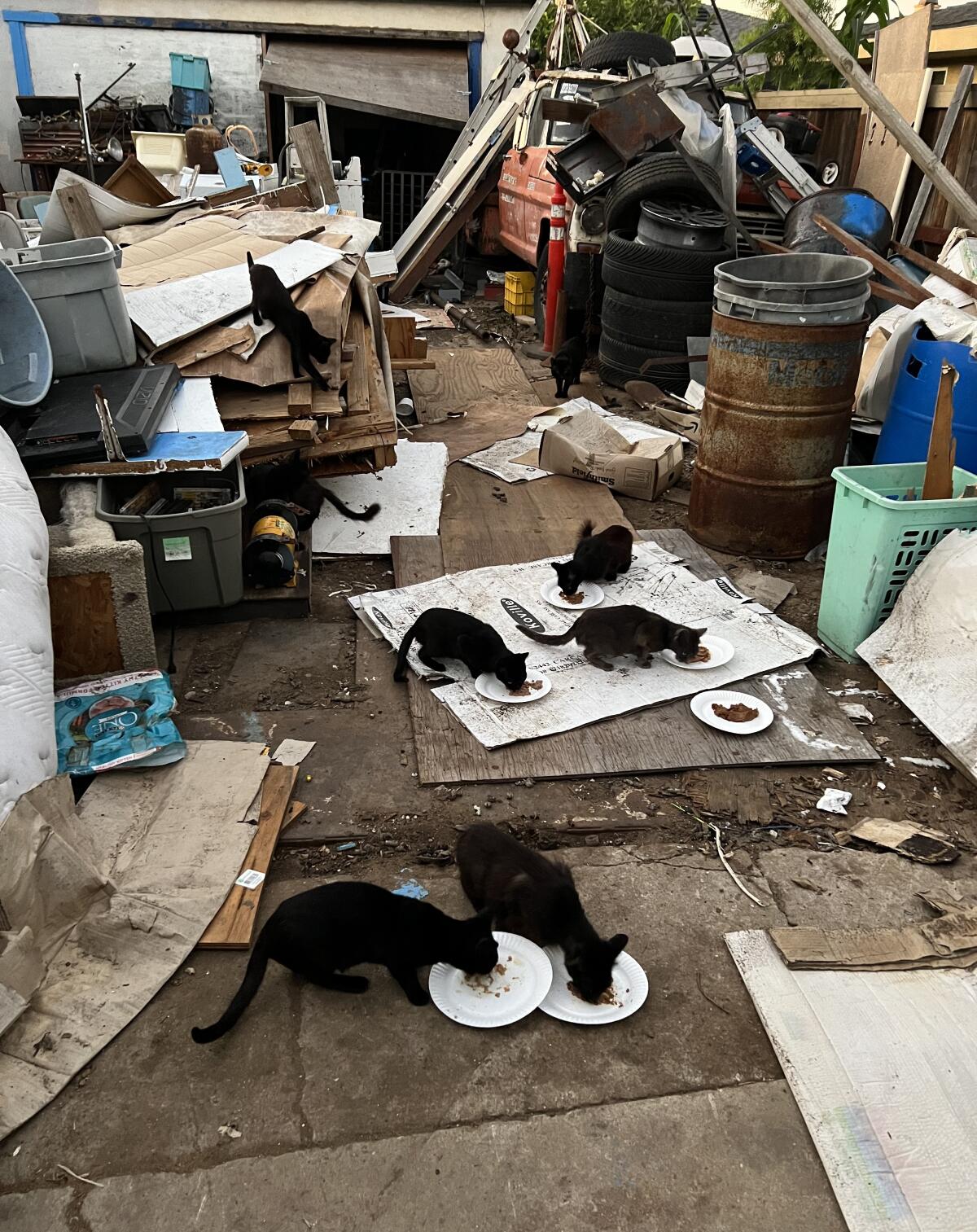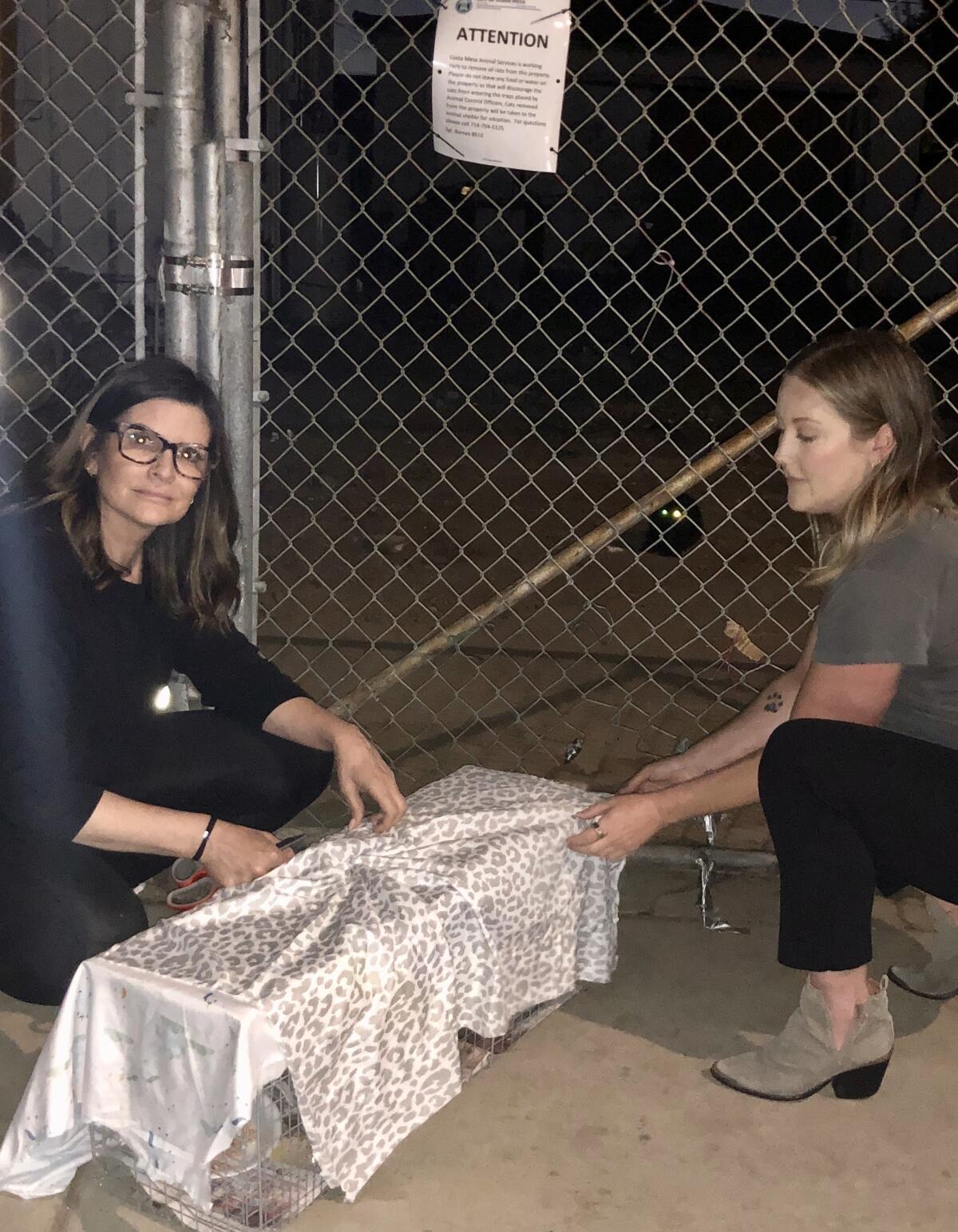After 7 years, a plan to legally trap, neuter, return feral cats in Costa Mesa may see light of day

- Share via
Costa Mesa’s Animal Services Committee has been working on an ordinance that would permit citizens to participate in the humane trapping, sterilization and return of feral cats into the areas in which they were found, a practice that is currently illegal in the city.
And in the seven years it’s taken for an ad hoc group to research and draft ordinance language and get the necessary permissions to place the new proposal before the City Council, feral cat populations continue to proliferate.
How much so? One unspayed female cat producing an annual average of three litters with four kittens apiece, half of which live to reach sexual maturity, could result in a net population of 22,908 felines in a seven-year period, according to an online population calculator.

That soon could change, however, as the committee is scheduled on Wednesday to formally discuss recommending the new policy for approval at the council level.
Proponents of trap, neuter and return, or TNR, say the process helps reduce the number of ownerless cats and their exponential legions of progeny, potentially decluttering shelters and reducing the cost burdens associated with their care and treatment.
The strategy is currently illegal in Costa Mesa, where the municipal code prohibits individuals from allowing animals “to stray or run or be at large in or upon any public street or other public place within the city.”
Local laws also fail to make a distinction between true ferals and “community cats,” who do not have traditional owners but are commonly recognized and fed by a loose coalition of neighbors known to them.
Instead, any cat without an owner is brought to Priceless Pets, a contractor that historically handled pet adoptions for the city and last year became its veterinary services provider. There, they are held for a period of seven days, like any other ward.
Priceless Pets owner Lisa Price said Friday while her staff technically have the ability to alter feral cats and release them where they were found, their hands are tied by the city’s laws.
An effort by animal activists has been underway since late August to tend to about two dozen feral cats at a property in Costa Mesa, but city officials say the animal control department is handling the situation.
“At this very moment we’re not allowed to release them back into Costa Mesa,” Price said. “I know Costa Mesa has such a heart for the animals. Animal [Services] has been amazing. They’ve been very good and they’re very pro-animal. Then you get down to this [law] and you’re like, ‘You want me to kill ferals?’ The city stops short right there.”
This leaves the contractor with two options — euthanize the cat, which costs roughly the same as spaying or neutering, or find somewhere else for it to go.
Price and her team work with barn cat groups and sanctuaries willing to take on ferals as “mousers,” sometimes in exchange for accepting 10 socialized, adoptable felines in return. It’s daunting work that, despite saving the life of one cat, results in a higher population and even more work for the nonprofit.
“It’s becoming increasingly difficult because those [groups] are not easy to find, and there are only so many animals they can take,” Price said, adding that the organization strives not to euthanize healthy animals simply for being feral. “But if there’s not someone readily available at that moment, unfortunately, that could be their fate.”
Costa Mesa resident Becca Walls serves as vice chair on the Animal Services Committee and has worked on the ad hoc group since 2018 to codify a trap, neuter and return policy, despite committee turnover, the COVID-19 pandemic and the reassignment in 2023 of Animal Services from the city’s parks department to its police department.
A lack of data on the effectiveness of trap, neuter and return specifically in Costa Mesa made it more complicated to convince city leaders that some kind of law change or program is needed, Walls said. But if the process were legalized, then data could be collected.
“I know several people who are already doing it, but they’re never going to come forward with the data if it’s illegal,” Walls added, referencing a 2023 cat hoarding incident in Costa Mesa that drew illegal trappers out of the shadows and into conflict with city workers.
“That incident was so negative for the community and people were so mad, it set back the relations we had with Animal [Services],” Walls recalled.
Meanwhile the issue, like the cat population, continues to grow. Before Priceless Pets began in 2024 working to transition feral cats to other communities, many were euthanized for behavioral problems. Between 2020 and 2023, a total of 91 cats were killed, compared to zero last year.
“Lisa’s doing everything she can to not let them die,” Walls said of the current situation. “Fosters are getting burned out on kittens — these are kittens that shouldn’t have been born in the first place. It’s just about making [TNR] legal.”
The proposed ordinance aims to legalize the practice by granting Costa Mesa residents a one-year permit, in exchange for agreeing that they will not trespass or enter a private property without permission, along with other conditions. Once altered, feral and community cats would be ear-tagged, a visible sign to avoid re-trapping, before being released.
After six months, the committee and Animal Services personnel would review the data and see whether a city-sponsored trap, neuter, return program might be an effective solution in the longer term.
Price said Friday she heartily agrees with legalizing the practice.
“Everyone is aware of my stance on that,” she said. “This is a huge step in being able to end overpopulation of cats, which means an overall less burden on everyone. It does make a difference, and the proof is in the pudding.”
The Costa Mesa Animal Services Committee’s next meeting takes place Wednesday at 5:30 in the Community Room at Costa Mesa City Hall, 77 Fair Drive.
All the latest on Orange County from Orange County.
Get our free TimesOC newsletter.
You may occasionally receive promotional content from the Daily Pilot.





